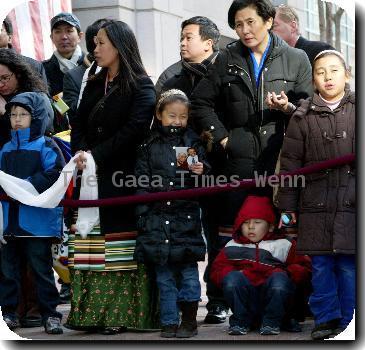Israeli leader regrets crisis with Washington, but apology gets cool reception in Washington
By Josef Federman, APSunday, March 14, 2010
Israeli apology gets cool reception in Washington
JERUSALEM — Israel’s prime minister expressed regret Sunday for a crisis with the United States over plans to expand a Jewish neighborhood in east Jerusalem, even as American officials played down the apology and called for bold Israeli action to get peace efforts back on track.
With tensions rising, Israel deployed hundreds of police around east Jerusalem’s Old City and heavily restricted Palestinian access to the area — the scene of several recent clashes.
Israel’s already strained relationship with the U.S. hit a new low last week when the Jewish state announced plans during a visit by Vice President Joe Biden to build 1,600 homes for Israelis in east Jerusalem, which Palestinians claim as their capital.
The announcement embarrassed Biden, who quickly condemned the plan, and cast a shadow over upcoming U.S.-mediated peace talks.
In his first public comments on the matter, Israeli Prime Minister Benjamin Netanyahu told his Cabinet Sunday that he was sorry about the diplomatic fiasco and had ordered an investigation into the incident. Netanyahu has claimed he had no prior knowledge.
“There was a regrettable incident that was done in all innocence and was hurtful, and which certainly should not have occurred,” Netanyahu said.
At the same time, he urged his Cabinet “not to get carried away and to calm down” and gave no sign he would scrap the settlement plan.
“We will act according to the vital interests of the state of Israel,” he said.
The fate of east Jerusalem is the most explosive issue in the Israeli-Palestinian conflict. Israel captured the area in the 1967 Mideast war and considers the entire city its capital. Netanyahu has said he will never agree to share control of the holy city.
The Palestinians claim the eastern sector — home to sensitive Jewish, Christian and Muslim holy sites — as the capital of a future state that would include the West Bank and Gaza Strip.
Israel’s annexation of east Jerusalem has not been internationally recognized, and the international community, including the U.S., considers the ring of Jewish neighborhoods Israel has built to be illegal settlements.
Within hours of Israel’s announcement last week, Biden condemned the plan and warned it could undermine U.S.-led indirect peace talks that are to start in the coming weeks. A day after Biden left, Secretary of State Hillary Clinton called Netanyahu and lectured him for 43 minutes to vent Washington’s frustration.
Even after Netanyahu’s apology Sunday, the U.S. condemnation showed no sign of easing.
Speaking on NBC television, President Barack Obama’s chief political adviser, David Axelrod, called Israel’s action an “affront” and an “insult.”
White House spokesman Robert Gibbs said the apology was merely a “good start.”
“I think what would be an even better start is coming to the table with constructive ideas for constructive and trustful dialogue about moving the peace process forward,” Gibbs told Fox TV.
Gibbs also confirmed that Clinton “outlined” steps the U.S. wants Israel to take. He declined to elaborate, but the steps could include a renewed American demand for Israel to halt all settlement construction.
Under American pressure, Netanyahu imposed a 10-month slowdown last November on settlement construction in the West Bank. But that order does not include east Jerusalem.
The showdown with the Americans has put Netanyahu in a difficult situation.
The prime minister is wary of antagonizing Israel’s most important ally. But any further curbs on settlement construction could splinter his coalition — a mixture of hawkish and Orthodox Jewish parties that are sympathetic to the settlement movement. Netanyahu himself has traditionally been a strong supporter of the settlers.
In light of the new construction plans, the Palestinians have threatened to call off U.S.-mediated talks before they even start. An Arab League advisory committee has already withdrawn its endorsement of the discussions.
U.S. Mideast envoy George Mitchell is expected in the region this week to try to salvage the talks.
The settlement dispute has further fueled an already tension situation in Jerusalem, where Arabs and Jews live together uneasily.
After successive weekends of clashes between Israeli security forces and Palestinians, hundreds of Israeli police were deployed Sunday around the Old City before the rededication of an important synagogue destroyed during the 1948 war that followed Israel’s creation.
Arab men under the age of 50 were barred from entering the disputed hilltop compound known to Jews as the Temple Mount and to Muslims as Haram as-Sharif, or Noble Sanctuary.
Israel also extended a closure, barring virtually all West Bank Palestinians from entering Israel.
Under heavy police guard, the rededication ceremony at the Hurva synagogue took place without incident Sunday. The synagogue, believed to date back some 2,000 years, was destroyed in 1721 and again reduced to rubble in the 1948 war.
In the West Bank, Israel arrested a leading member of the Hamas militant group’s military wing on Saturday night.
The army said Maher Udda had been wanted for more than a decade for his involvement in attacks that killed more than 70 Israelis. Among them, was an American-born doctor who headed an emergency room, David Appelbaum, and his daughter, who were killed in a 2003 suicide bombing at a restaurant on the night before her wedding.
A statement Sunday described Udda as one of Hamas’ founders in the West Bank city of Ramallah.
Associated Press writers Diaa Hadid and Shira Rubin contributed to this report.
Tags: Barack Obama, District Of Columbia, Hillary Clinton, International Agreements, Israel, Jerusalem, Judaism, Middle East, North America, Palestinian Territories, Territorial Disputes, United States, West Bank

